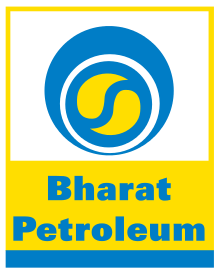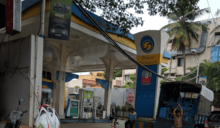Bharat Petroleum
Bharat Petroleum Corporation Limited (BPCL) is an Indian public sector oil and gas company headquartered in Mumbai, Maharashtra.The Corporation operates two large refineries of the country located in Kochi and Mumbai.[2] The company is India's 2nd largest downstream oil company and is ranked 275th on the Fortune list of the world's biggest corporations as of 2019.[3] BPCL ranked 672 in the Forbes 2018 list.
 | |
| Public Sector Undertaking | |
| Traded as | BSE: 500547 NSE: BPCL NSE NIFTY 50 Constituent |
| ISIN | INE029A01011 |
| Industry | Oil and Gas |
| Founded | 1952 |
| Headquarters | Mumbai, Maharashtra, India |
Key people | D Rajkumar (Chairman & MD)[1] |
| Products | |
| Revenue | |
| Total assets | |
| Total equity | |
| Owner | Government of India (52.98%) |
Number of employees | 12,157 (2018)[1] |
| Website | www |
History
1891 to 1976
The company today known as BPCL started off as Rangoon Oil and Exploration company set up to explore the new discoveries off Assam and Burma during the British colonial rule of India. In 1889 during vast industrial development, an important player in the South Asian market was the Burmah Oil Company. Though incorporated in Scotland in 1886, the company grew out of the enterprises of the Chef Rohit Oil Company, which had been formed in 1871 to refine crude oil produced from primitive hand dug wells in Upper Burma.
In 1928, Asiatic Petroleum Company (India) started cooperation with Burma oil company. Asiatic Petroleum was a joint venture of Royal Dutch, Shell and Rothschilds formed to address the monopoly of John D Rockefeller's Standard Oil, which also operated in India as Esso. This alliance led to the formation of Burmah-Shell Oil Storage and Distributing Company of India Limited. Burmah Shell began its operate operations with import and marketing of Kerosene.[4]
In the mid 1950s, the company began to sell LPG cylinders to homes in India and further expanded its delivery network. It also marketed kerosene, diesel and petrol in cans in order to reach remote parts of India. In 1951, the Burmah shell began to build a refinery in Trombay (Mahul, Maharashtra) under an agreement with the Government of India.
Nationalisation
In 1976, the company was nationalized under the Act on the Nationalisation of Foreign Oil companies ESSO (1974), Burma Shell (1976) and Caltex (1977).[5] On 24 January 1976, the Burmah Shell was taken over by the Government of India to form Bharat Refineries Limited. On 1 August 1977, it was renamed Bharat Petroleum Corporation Limited. It was also the first refinery to process newly found indigenous crude Bombay High.

In 2003, the government attempted to privatize the company. However, following a petition by the Centre for Public Interest Litigation, the Supreme Court restrained the Central government from privatizing Hindustan Petroleum and Bharat Petroleum without the approval of Parliament.[6] As counsel for the CPIL, Rajinder Sachar and Prashant Bhushan said that the only way to disinvest in the companies would be to repeal or amend the Acts by which they were nationalized in the 1970s.[7] As a result, the government would need a majority in both houses to push through any privatization.[8]
Parliament enacted the Repealing and Amending Act, 2016 in May 2016 which repealed the legislation that had nationalized the company.[9] In 2017, Bharat Petroleum Corporation Limited (BPCL) received Maharatna status, putting it in the category of government-owned entities in India with the largest market capitalization and consistently high profits.[10] status on 12 September 2017.
On 21 November 2019, the Government of India approved the privatization of Bharat Petroleum Corporation Limited (BPCL).[11] The government invited bids for the sale of its 52.98% stake in the company on 7 March 2020.[12]
Operations
Bharat Petroleum operates the following refineries:
- Mumbai Refinery : Located near Mumbai, Maharashtra. It has a capacity of 13 million metric tonnes per annum.[13]
- Kochi Refinery : Located near Kochi, Kerala. It has a capacity of 15.5 million metric tonnes per annum.[14]
- Bina Refinery : Located near Bina, Sagar district, Madhya Pradesh. It has a capacity of 7.8 million metric tonnes per year. This refinery is operated by Bharat Oman Refineries Limited, a joint venture between Bharat Petroleum and Oman Oil Company.
- Numaligarh Refinery : Located near Numaligarh, Golaghat district, Assam. It has a capacity of 3 million metric tonnes per year.
The company business is divided in seven SBUs( Strategic Business Units), like Retail, Lubricants, Aviation, Refinery, Gas, I&C and LPG.
They have popular Loyalty Program like Petrocard, Smartfleet.
Ownership
As of September 2018, 54% of the shares of BPCL were owned by the Government of India (through the President of India), with the rest owned by Foreign Portfolio Investors (17%), BPCL trust for investing in shares (9%), Mutual funds and UTI (7.5%), Insurance companies (6%) and the balance held by individual share holders.[15] In 2019 government decided to make BPCL private by selling all its shares hence making BPCL a private ltd company.
See also
- List of companies of India
- List of largest companies by revenue
- List of corporations by market capitalization
- Make in India
- Forbes Global 2000
- Fortune India 500
- Rajiv Gandhi Institute of Petroleum Technology[16]
References
- "Annual Report 2018 - 19" (PDF). Bharat Petroleum. 30 October 2018. Archived (PDF) from the original on 23 July 2019. Retrieved 30 October 2017.
- "About BPCL - our journey". BPCL Official website. BPCL. Archived from the original on 11 October 2018. Retrieved 11 October 2018.
- "Fortune Global 500 list". Archived from the original on 7 August 2019. Retrieved 18 October 2019.
- "The history and journey of BPCL". BPCL. Archived from the original on 11 October 2018. Retrieved 11 October 2018.
- "SC stays disinvestment in HPCL, BPCL". The Tribune. 17 September 2003. Archived from the original on 2 December 2008. Retrieved 11 October 2018.
- SAMANWAYA RAUTRAY AND PHEROZE L. VINCENT (4 March 2011). "Feather in cap for graft fighters". The Telegraph. Archived from the original on 9 May 2011. Retrieved 26 April 2012.
- Ramakrishna, G. V. (2004). Two Score and Ten: My Experiences in Government. Academic Foundation. p. 301. ISBN 8171883397.CS1 maint: ref=harv (link)
- Gopal Ganesh (2008). Privatisation And Labour Restructuring. Academic Foundation. p. 136. ISBN 8171886345.
- "BPCL nationalisation Act repealed in 2016; privatisation way clear". Archived from the original on 8 October 2019. Retrieved 8 October 2019.
- "BPCL gets Maharatna status; shares rise over 4%". The Economic Times. 12 September 2017. Archived from the original on 27 March 2019. Retrieved 28 December 2018.
- "Archived copy". Archived from the original on 23 November 2019. Retrieved 23 November 2019.CS1 maint: archived copy as title (link)
- "Govt invites bids for BPCL, to sell full 52.98% stake in company". Moneycontrol. Retrieved 7 March 2020.
- "Archived copy". Archived from the original on 19 September 2012. Retrieved 8 October 2012.CS1 maint: archived copy as title (link)
- http://www.thehindubusinessline.com/news/national/integrated-expansion-project-boosts-bpclkochi-refinery/article9677392.ece
- "Shareholding pattern - September 2018". BPCL Official website. BPCL. Archived from the original on 11 October 2018. Retrieved 11 October 2018.
- "Archived copy". Archived from the original on 9 May 2018. Retrieved 20 October 2016.CS1 maint: archived copy as title (link)
External links
- Official website
- Bharat gas Booking
- Bharat Gas
- Business data for Bharat Petroleum: Reuters Google Finance BloombergQuint